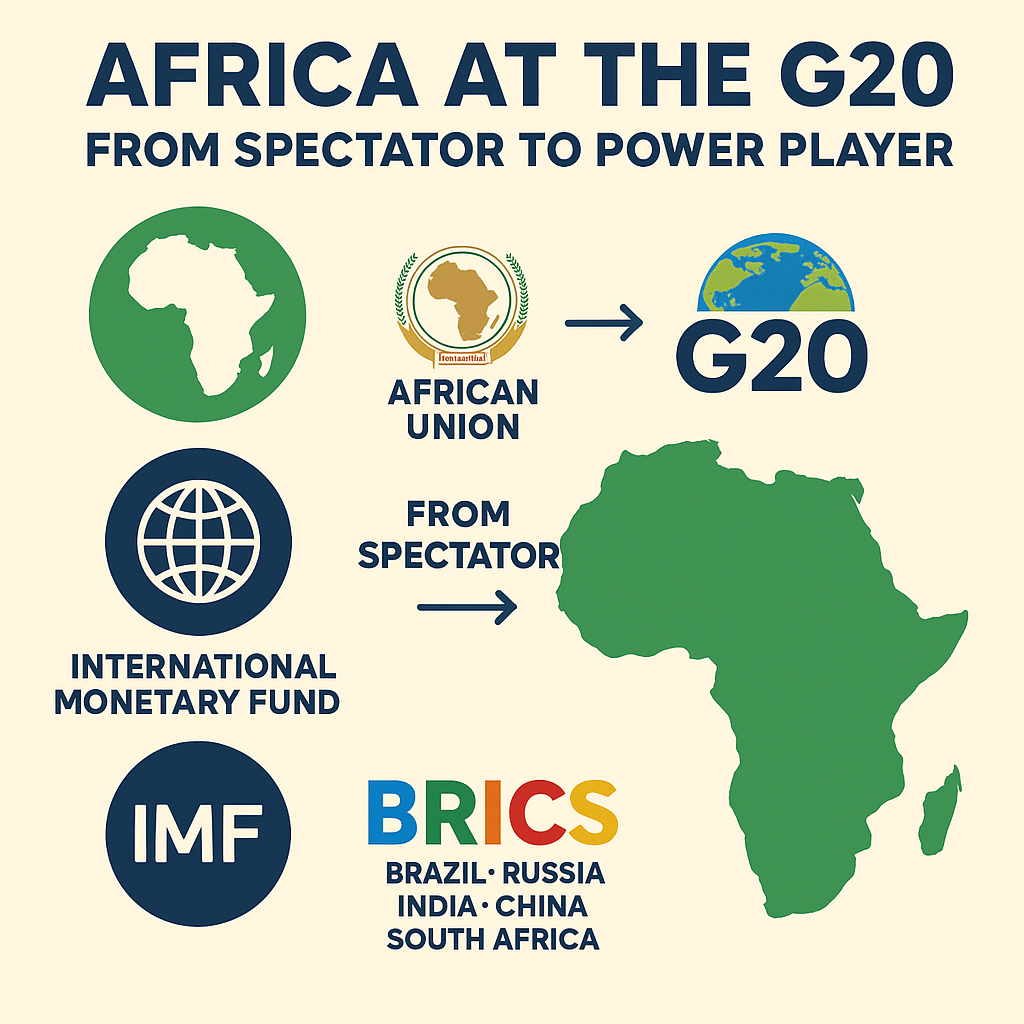
By Kemi Osukoya | The Africa Bazaar
As the fourth G20 Finance Ministers and Central Bank Governors’ Meeting wrapped up this week in Washington D.C. on the margin of World Bank-IMF Annual Meetings, it marked more than another high-level economic gathering. It was a historic first — the first time the world’s 20 leading economies convened on African soil.
For leaders from across the continent, the symbolism was powerful. But for Eswatini’s Finance Minister Neal Rijkenberg, who is this year’s African Union G20 delegate, it was also deeply practical.
“The African Union was never part of the G20,” Rijkenberg told the Africa Bazaar magazine during an exclusive interview in Washington DC. “About three years ago, we were only invited as spectators. Now we have a permanent seat around the table. That means we finally have a real voice.”
Redefining Africa’s Role in the Global Economy
The meeting, hosted under South Africa’s G20 presidency, placed African priorities at the forefront of the global economic agenda—from reforming international finance to navigating the fast-moving world of Artificial Intelligence and digital currencies.
“It’s lovely having it on the continent,” Rijkenberg said with a smile. “But the big thing is that we actually have a strong hand in the agenda. Africa was very much part of today’s meeting—and will be again when the summit reconvenes in November. It means our issues are finally in the spotlight.”
PARTNER’S PRODUCT
For decades, African economies have been shaped by global financial decisions made in distant capitals. With the African Union now holding a permanent G20 seat, leaders hope that dynamic will begin to change. The continent’s growing integration through the African Continental Free Trade Area (AfCFTA) and regional blocs like the Arab Maghreb Union, Common Market for Eastern and Southern Africa, Economic Community of West African States, Economic Community of Central African States, and Southern African Development Community add weight to Africa’s collective voice.
“This is not symbolic. It’s structural. Africa now has a voice at the table.” –Eswatini’s Finance Minister
One of the most urgent debates of this year’s G20 Finance Ministers and Central Bank Governors meetings focused on the global financial architecture—how it serves, or fails, the developing world.
“The international financial framework, as it stands, often hurts developing countries more than it helps,” Rijkenberg explained. “So we’re asking: How can we change it to work better for us?”
The conversation delved into debt sustainability, access to climate finance, and the role of multilateral lenders like the IMF and World Bank—institutions that many African officials argue have yet to adapt to the continent’s realities.
RELATED VIDEO
Another hot topic was the future of AI, stablecoins, and cryptocurrencies, and how emerging technologies are reshaping global finance.
“Once again, it’s the developing countries that risk losing out,” Rijkenberg said. “We have to safeguard our economies before innovation drains value away from us.”
Digital Leapfrogging—and Its Risks
Yet for all the challenges, Africa’s leaders also see opportunity. The continent, home to some of the fastest-growing fintech ecosystems in the world, has already used mobile money and digital innovation to bypass legacy banking systems.
“Because financial inclusion is still quite low in Africa, cryptocurrencies and virtual currencies could be a huge leap forward,” he said. “It’s about getting people financially included — once that happens, the world opens up.”
Artificial intelligence, too, could offer Africa a unique advantage. While global debates swirl around job losses from AI automation, Africa’s relatively smaller white-collar workforce could allow it to absorb the benefits faster than most.
“AI can help us leapfrog,” Rijkenberg said. “We can reap the rewards without suffering the same level of job displacement. But we must still protect ourselves — these technologies carry risks.”
For many African policymakers, the ultimate goal of South Africa’s G20 presidency is to ensure that Africa’s issues are not treated as one-off talking points, but as permanent fixtures of global economic planning.
“At the end of the G20,” Rijkenberg said, “what we want is for Africa’s agenda — our issues, our priorities — to become part of the long-term discussions. Panels and working groups have been set up that will continue beyond this year. That’s what success looks like.”
The stakes extend far beyond the G20’s annual cycle. Africa’s growing participation in platforms like BRICS and the G20 places it at the center of a shifting global order — one in which developing economies are no longer passive recipients of policy, but active shapers of it.
Still, this new visibility comes with its own tensions. Aligning with both Western-led groups like the G20 and alternative blocs like BRICS means navigating competing priorities — particularly as global powers realign in the wake of U.S. and NATO policy shifts.
Yet for now, the mood across Africa is one of optimism — cautious, but genuine.
“Global fragmentation can be Africa’s opportunity,” Rijkenberg reflected. “We have the talent, the innovation, and now, finally, the seat at the table. The real question is — how do we use it?”




